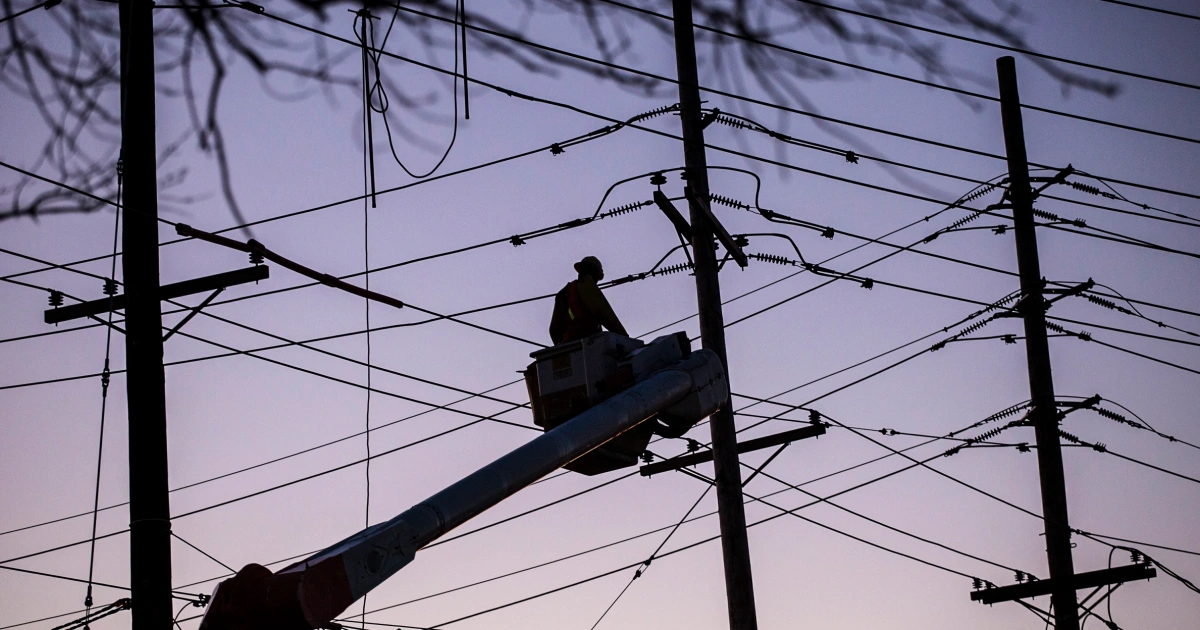
Soaring electricity costs have become a major issue in this year’s race for governor in New Jersey — previewing a potential national battle over energy prices that could put both parties on defense in next year’s midterm elections.
Democrat Mikie Sherrill and Republican Jack Ciattarelli have both focused on the issue in their opening salvos on the airwaves, a sign that surging electric bills are top of mind for New Jersey voters less than two months before Election Day.
“Day 1 as governor, I’m declaring a state of emergency on utility costs using emergency powers to end these rate hikes and drive down your bills,” said Sherrill, a Navy veteran, while piloting a helicopter in her first TV ad of the general election.
Ciattarelli, a former state legislator, pledged in his first TV ad of the fall to “lower electricity bills, cut and cap property taxes, and keep our community safe.”
And Restore NJ, an outside group backed by the Republican Governors Association also launched a TV ad alleging that Sherrill “supports the failed energy plan that tripled our electric bills this summer.”
New Jersey’s Board of Public Utilities warned earlier this year that monthly electricity bills could rise between 17% and 20% starting on June 1. Board President Christine Guhl-Sadovy attributed the price hike to “rapidly increasing demand for electricity, coupled with limited supply growth due to lagging new generation interconnection, and flawed market dynamics in the PJM region,” referring to the grid operator that services several states.
New Jersey voters, though, are divided over whom to blame.
A Fairleigh Dickinson University poll conducted in July found 26% of New Jersey voters blamed utility companies for higher energy bills, 19% blamed Democratic Gov. Phil Murphy, 15% blamed the federal government and 14% blamed the state Legislature.
In a Quinnipiac University poll of likely New Jersey voters released Wednesday and conducted Sept. 11-15, 42% said Sherrill would do a better job handling the issue, while 40% said Ciattarelli would do better — inside the poll’s margin of error — and 17% said they do not know or declined to answer the question.
Fighting over responsibility
As Ciattarelli and his allies have worked to tie Sherrill to Murphy on electricity prices, some Republicans believe the issue could give the party an edge in the Democratic-leaning state, which President Donald Trump lost by 6 points last year.
Carlos Cruz, a spokesman for the pro-Ciattarelli super PAC Change NJ, likened this year’s race to former GOP Gov. Chris Christie’s first campaign, when voters were looking for a change from Democratic leadership in the blue state.
“Change plus corruption got [Christie] over the hump,” Cruz said. “I think this is a ‘change plus energy’ year.”
For his part, Ciattarelli has pledged to take an “all of the above” approach to energy, ban offshore wind farms and withdraw New Jersey from a 10-state agreement to reduce carbon dioxide emissions. He has placed the blame for rising costs on Murphy, who cannot run for re-election due to term limits, and Democrats leading the state government.
“My opponent wants to blame high electricity rates on President Trump,” Ciattarelli said at a campaign stop in Passaic last month. “Here’s the fact: In 2018, New Jersey was an electricity exporter. We produced more than we needed and sold it to other states. Today, we have to buy it. That was all since Phil Murphy took office. And my opponent says she wants to go back to the windmills. They are never going to be able to satisfy our energy needs.”
Sherrill did clash with Murphy on electricity prices over the summer when the current governor raised doubts about whether it was possible for Sherrill to follow through on her pledge to freeze utility rates for one year. Sherrill responded on X by writing that she is “tired of hearing that lowering your electric bill is … ‘too hard’ or ‘not doable.’”
Sherrill’s other plans to address rising electricity costs include pushing for “new nuclear capacity,” along with “immediately breaking ground on new solar and battery storage projects, expediting capacity upgrades at our existing nuclear plants, and streamlining the modernization of existing natural gas facilities to make them cleaner and more efficient.”
“My priority is relief to New Jersey consumers, and I will bring everyone to the table to deliver it — and already, legislators have rallied around the approach and even the utility companies have suggested they are willing to cooperate,” Sherrill said in a statement to NBC News. “I learned in the Navy to find a way or make one, there’s no time for timid or weak leaders like Jack Ciattarelli who refuse to take on Trump, our grid operator PJM, or the utility companies to lower costs for New Jersey.”
More battles ahead?
The battle over electricity costs playing out in New Jersey could be a preview of fights to come in other states in next year’s midterm elections.
The U.S. Bureau of Labor Statistics’ most recent consumer price data found that electricity prices are rising faster than the rate of overall inflation, rising by 6% compared to last year, while inflation was at 2.9%.
Both parties have signaled that the surging prices could be a salient campaign issue. The issue has already started to pop up in battlegrounds beyond New Jersey, with Democrats arguing that measures aimed at reducing wind and solar projects in Trump’s sweeping tax cut and spending legislation will drive up electricity prices.
In this year’s race for governor in Virginia, former Democratic Rep. Abigail Spanberger has knocked Republican Lt. Gov. Winsome Earle-Sears for saying the legislation “does so many great things.”
“No, the bill raises the cost of health care, mortgages, electricity, gas,” a narrator says in a TV ad from Spanberger’s campaign. “You pay more, so billionaires pay less.”
Protect Our Jobs, a group that advocates for clean energy, launched TV ads in several competitive House districts featuring an electrician who works in solar energy and says he is “seeing Republicans in Washington trying to eliminate jobs like mine.”
“Americans are struggling with skyrocketing costs, but instead of cutting energy prices in half like he promised, Donald Trump and his rubber stamps have ushered in a 10% rate hike. With the demand for energy rising, Republicans will have to justify taking cheaper, faster energy sources offline at a time when their constituents need it most,” Alex Glass, communications director for Climate Power, a group focused on electing “climate champions,” said in a statement.
“From now until election day, voters will be reminded that they are footing the bill for Trump and Republicans to give tax breaks to billionaires,” Glass added.
But Republicans also see a political opening on the issue by pointing to Democrats’ support for clean energy as a factor behind rising prices.
“I think there’s going to be a huge discussion on energy from now until November, because a lot of Democratic governors doubled down on green energy and have seen their electricity bills spike when offshore wind and other green energy sources have not come to fruition yet,” said New Jersey Republican strategist Jeanette Hoffman.
Whether there’s a unilateral political edge on the issue across the country remains to be seen. A recent poll commissioned by Heatmap Pro, a climate news outlet, found that registered voters put the most blame for rising electricity costs on rising demand, their electric utility companies and their state governments. At least 80% of respondents said they blame each of those groups “a lot” or “a little.”
There’s broad partisan agreement about all three groups across Republicans, Democrats and independents, as well as some notable distinctions. In particular, Republicans in states former Vice President Kamala Harris won in 2024 are far more likely to blame their state government “a lot,” compared to Democrats in those states or residents of either party in Trump states.
Meanwhile, in Washington, Energy Secretary Chris Wright recently acknowledged that there is a political risk for Republicans as electricity prices rise, even though he blamed the rise on “momentum” stemming from “Obama-Biden policies.”
“That momentum is pushing prices up right now,” Wright told Politico. “And who’s going to get blamed for it? We’re going to get blamed because we’re in office.”
The same, of course, is true for governors and legislators in each state, as both parties push on the issue.



